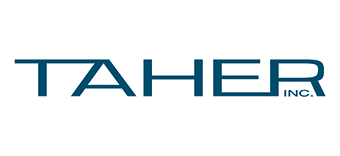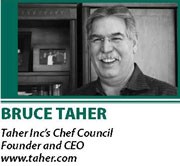 Bruce Taher, founder and CEO of Taher Inc., a foodservice management company based in Minnetonka, loves the chefs that work for him-particularly those on his Chef Council, a group of about a dozen chefs that are charged with maintaining and influencing the company’s extensive menu database. It’s a well-traveled group that’s coveted by many in the industry, Taher said. So much so, that attempts to hire them away aren’t unusual. “A competitor will call in (to a chef ), and say, ‘Hey, I see you’re on the Chef Council, you travel, you know a lot, we’re hoping to do something, but we can’t, so, what if we hire you?'”
Bruce Taher, founder and CEO of Taher Inc., a foodservice management company based in Minnetonka, loves the chefs that work for him-particularly those on his Chef Council, a group of about a dozen chefs that are charged with maintaining and influencing the company’s extensive menu database. It’s a well-traveled group that’s coveted by many in the industry, Taher said. So much so, that attempts to hire them away aren’t unusual. “A competitor will call in (to a chef ), and say, ‘Hey, I see you’re on the Chef Council, you travel, you know a lot, we’re hoping to do something, but we can’t, so, what if we hire you?'”
Fortunately, loyalty runs deep at Taher. Chris Miller and Mark Augustine have worked as chefs at Taher for eight years after successful careers in hotels, country clubs and catering. “It’s easy to work for someone that has the same passion for food (as you do),” Augustine said.
He and Miller have been Chef Council members for several years. “I’m in awe at the knowledge and talent in this team,” Miller said. “You put them all in one room, and I doubt you’d find a better one in the business.”
The company’s reputation continues to attract top talent, such as recent hires Donald Gonzalez, a French Laundry alum, who is the executive chef at the Taher Inc.-owned Forepaugh’s in St. Paul, and local legend Paul Laubignat (who is called “The Professor”) who owned and operated Chez Paul in Minneapolis and Nancy’s Landing in Waconia. It’s Laubignat’s second tenure with Taher Inc., bookends for his successful turn as restaurateur. “Bruce was my best customer at Chez Paul,” he said. Laubignat traveled as a member of the Chef Council on the groups visit to Japan this fall. It’s the focus on food above all else that is responsible for the company’s success, a mantra each chef repeated.
Taher, who worked in kitchens since his college days, started the company in 1981, after working for Interstate United, a large foodservice contractor that began going through a series of mergers, acquisitions and break-ups. “That’s when I realized it was time to do something,” he said.
Now, 28 years later, “We’ve got a lot of bumps and bruises and arrows, but we’re still here,” he joked.
Here, and well-represented with hundreds of accounts in many states, including Texas, Kansas, Nebraska, the Dakotas, Iowa, Wisconsin, Michigan, Illinois, Indiana, Ohio and California. Taher Inc. operates a wide variety of foodservice operations, including corporate offices, K-12 schools, assisted living facilities and universities. The company’s production kitchen in Plymouth, Minn., produces about 8,000 meals per day (half for Meals on Wheels and senior nutrition programs) and it leapt aggressively into the restaurant arena in Minnesota, first with the Wayzata Eatery in 2007, and with the recent purchases of Forepaugh’s and the Timberlodge Steakhouse chain. “What we really try to do is nothing terribly complicated-we try to prepare our meals from scratch,” Taher said. “And once we say that we’re going to prepare from scratch, that obviously requires a group of professionals.”
As the company grew, Taher decided it needed a team to provide menu leadership, and ten years ago he started the Chef Council with six chefs (plus himself ). He has since expanded it to 12 members (with still another six rotating “guest” members, Taher said). The chefs are from each segment of Taher Inc.’s foodservice operations. He began taking the council to food destinations across the country: New York, San Francisco, Chicago, New Orleans. “Then, I think we just graduated from U.S. Cities,” he said, and traveling abroad became the norm. “It really is a huge thing for us, particularly for time and money, but the results, obviously, are very good.”
The trips abroad began with northern Italy about six years ago, followed by trips to southern Italy, Spain (twice), and southern France. One result: “A lot of the menu items that we have, have that European touch,”Taher said.
Then it was off to the Far East and Thailand, touring the area and diving into cooking classes. Then there was the ten days in Mexico City and surrounding areas.
Turkey. Morocco. India. And, this fall, Japan. Laubignat, Miller and Augustine voices conveyed the excitement from the trip as they scrolled through digital photographs of the various markets, meals and eateries they encountered. Taher spun tales about all the trips, and arrived at a singular point: “What’s really exciting about these trips is not just the food, but you get to see the area, you get to experience the culture, the history, you get to smell it, feel it, and I think those are all really an integral part of what the experience with the food is.”
It’s the experience (and all the notes collected) he expects each of the chefs to incorporate into menu development. “We eat and drink, really, all day,”Taher said with a laugh, adding that he gives the chefs cash and the chore of eating “anything your heart desires.” But Taher then said seriously, “There are really no rules, except just one rule: When you come back, you have to bring ideas for our customers. That’s obviously the purpose of it.”
Miller, Augustine and Laubignat concurred. While it is fun, “we work hard on these trips,” Miller said. “We’re up early, and get into schools, restaurants (to see how they are operated).”
Before the group leaves a country, Taher explained, the chefs meet, divide into their account categories, and make lists of all the items consumed that would work in their location, “because they know their equipment and their customers.” Photographs of each item are also compiled.
Back home, the group meets for sessions in the company’s production kitchen in Plymouth. “We put on our chef coats and start producing all of these items, which is really kind of a hoot,” Taher said, laughing. But the development is very serious, and the Council chefs perfect flavors and document meticulously, tracking product numbers and costs from various suppliers, and procuring unavailable ingredients (usually spices) from elsewhere if necessary.
The recipes, including photographs and product numbers, are then made available to all Taher Inc. accounts and chefs. Regular regional training seminars also keep chefs in and cooks up to speed on the new menu items.
Impact on the company’s menus is widespread to all accounts, from simple, authentic and healthy Mexican fare at high schools, to Turkish kebobs and na’an at universities, to the chef stations and various cuisines served at an account such as HealthPartners corporate offices. And, there’s the obvious benefit for Taher Inc.’s restaurant chefs.
The company treats its corporate account meals as they would in at a restaurant, by serving food on china, rather than disposable flatware and cutlery. It makes the point that the food being served doesn’t come from a box, Taher said, rather the hard work from a team of skilled chefs and cooks, starting with the Chef Council. “There’s a lot of talent in that group. It’s an awesome thing.”
-Mike Mitchelson
http://www.foodservicenews.net/PDF/FSN_Top_Chefs_Book_09.pdf



